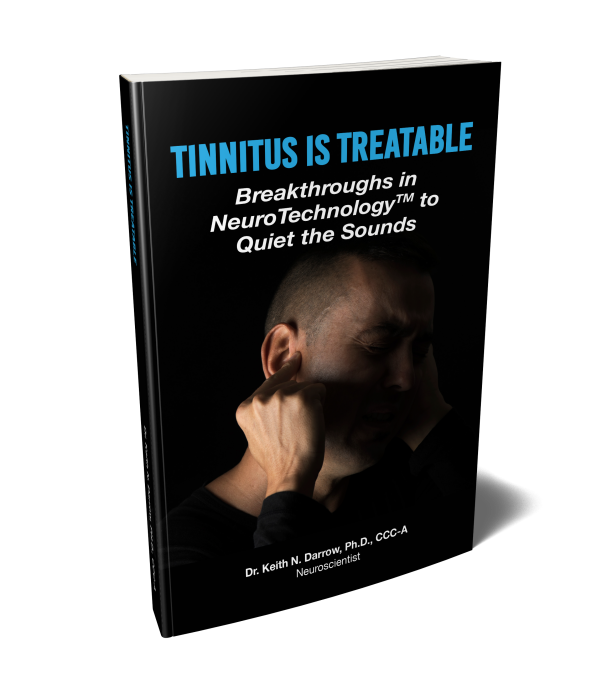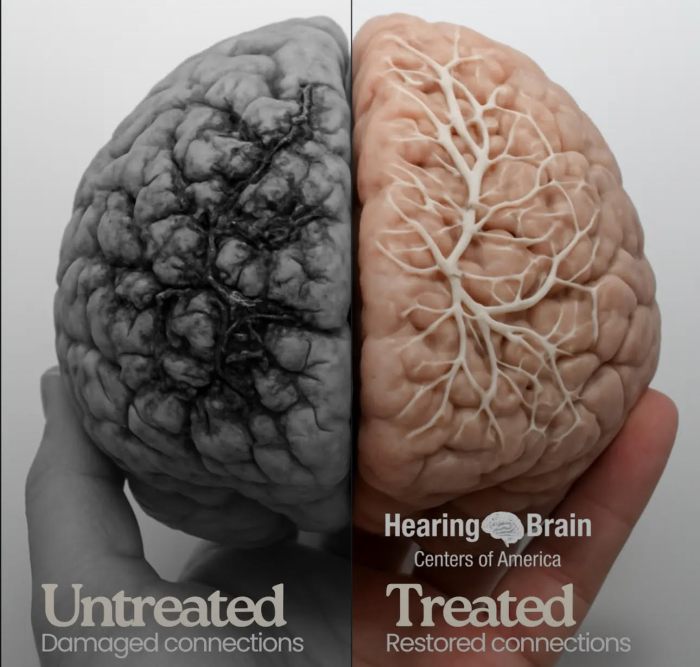Struggling with the constant buzz of tinnitus or the frustration of hearing loss? You’re not alone and you’re not without hope. More than 50 million Americans live with tinnitus, and millions more experience some form of hearing loss. What once seemed like an untreatable burden has now become an area of medicine filled with new hope, research breakthroughs, and life-changing treatment options.
At Hearing and Brain Centers of America, we know that the challenges of tinnitus and hearing loss extend far beyond hearing itself. These conditions affect mental health, relationships, work, and overall quality of life. Thankfully, advances in science and technology are transforming how these conditions are understood and treated.
A Better Understanding of the Brain’s Role
One of the most significant breakthroughs in recent years has been the recognition of how deeply connected hearing is to the brain. For decades, treatments focused almost exclusively on the ears. But researchers have now discovered that tinnitus and hearing loss are largely brain-based conditions.
“Tinnitus or phantom sounds are the direct result of your nerves breaking down from your ear to brain,” explains Dr. Keith Darrow, a neuroscientist and clinical audiologist trained at Harvard and MIT. “If left untreated, this condition can lead to much more serious problems, including hearing loss, loss of balance, and even dementia.”
In other words, hearing loss is not just about the inability to hear it is about how the brain processes sound. By shifting the focus from the ear alone to the ear-brain connection, today’s treatments are more effective than ever before.
The Impact of Untreated Hearing Loss
Hearing loss and tinnitus are not just inconveniences; they are serious health concerns. Untreated hearing loss has been linked to anxiety, depression, social withdrawal, and even cognitive decline. Many people find that what begins as a mild annoyance gradually interferes with daily conversations, work performance, and family life.
Tinnitus, often described as a ringing, buzzing, or whistling sound in the ears, can be equally disruptive. For some, it is a minor background noise, but for others, it becomes a constant distraction that interferes with sleep, concentration, and peace of mind. Left unaddressed, these conditions can slowly chip away at a person’s emotional and physical well-being.
The good news is that effective treatments now exist—and early intervention makes a world of difference.
Five Medical Benefits of Treating Hearing Loss
While many people initially seek help for hearing loss simply to hear better, the medical benefits go far beyond improved communication. Treating hearing loss can lead to powerful improvements in overall health and well-being. Here are five proven benefits:
- Increase in Quality of Life
People who treat their hearing loss often report feeling more connected, confident, and socially active. Better hearing supports stronger relationships, increased work productivity, and improved emotional health. Patients often describe it as “getting their life back.”
- Reduce the Risk of Falling
Research shows that untreated hearing loss is associated with a greater risk of falls, due to decreased spatial awareness and balance. By treating hearing loss, patients may improve coordination and physical safety, reducing the likelihood of accidents.
- Increase Cognitive Function
When the brain struggles to process unclear sound signals, it has to work harder—consuming precious mental energy. This “cognitive load” leaves less room for memory, focus, and clear thinking. Prescriptive hearing technology and other treatments help reduce that load, freeing up the brain to function at its best.
- Reduce the Experience of Tinnitus
Tinnitus often coexists with hearing loss. Treating hearing loss—especially with prescriptive hearing technology—can significantly reduce the severity and impact of tinnitus symptoms. Many patients find that their tinnitus becomes less noticeable and easier to manage after treatment.
- Reduce the Risk of Dementia
Numerous studies have linked untreated hearing loss to an increased risk of cognitive decline and dementia. By addressing hearing loss early, patients can help protect long-term brain health, potentially reducing their risk of developing dementia.

Dr. Keith Darrow’s Contributions
Dr. Keith Darrow, Ph.D., is a Harvard Medical and MIT-trained neuroscientist and clinical audiologist who has dedicated his career to helping patients understand and overcome hearing loss and tinnitus. Through his books, Silenced: The Medical Treatment of Tinnitus and Quiet: Living with Less Noise, Dr. Darrow provides education, success stories, and practical strategies to help patients take control of their hearing health.
These resources explain the science behind hearing conditions, showcase real patient experiences, and highlight the importance of early intervention. Readers can learn more by visiting Silencethesounds.com for Dr. Darrow’s tinnitus book, or HBCABookOffer.com to request his book on hearing loss and preventing decline.
Patient Success Stories
One of the most powerful testaments to the effectiveness of modern treatments comes from patients themselves. Take Steve Ruesch, for example, a local patient who once found his tinnitus overwhelming. Steve’s constant ringing left him irritable, exhausted, and disconnected from his loved ones. But after seeking help and addressing his tinnitus, Steve reports a dramatic improvement, not just in his hearing, but in his overall quality of life. His story is a reminder that no one has to suffer in silence.
Stories like Steve’s are becoming more common. Patients who once believed there was no solution are now finding that modern treatments can significantly reduce symptoms and restore peace of mind.
The Bigger Picture: Hearing Health and Brain Health
The research is clear: hearing health and brain health are inseparable. Treating hearing loss is not just about turning up the volume on life’s sounds; it’s about protecting your brain, your memory, your balance, and your future.
Unfortunately, too many people delay treatment, believing that hearing loss is a minor issue or a normal part of aging. The reality is that untreated hearing conditions can accelerate physical decline and diminish independence. Early treatment is one of the most powerful steps you can take to maintain long-term health.
Moving Forward with Hope
For many people, the hardest step is simply reaching out for help. Hearing and Brain Centers of America is committed to removing the uncertainty that surrounds hearing and tinnitus treatment. With advanced diagnostic tools, prescriptive technology, and compassionate care, our team works with each patient to create a treatment plan that restores confidence and quality of life.
Whether you are personally struggling with tinnitus or hearing loss, or know someone who is, now is the time to act. These conditions are not simply nuisances to be endured—they are medical concerns with real solutions.
Take the First Step
Relief is possible. At Hearing and Brain Centers of America, our mission is to educate, empower, and provide effective treatment for those living with tinnitus and hearing loss. Don’t wait until symptoms worsen. The earlier treatment begins, the more effective it can be.
Learn more by visiting Silencethesounds.com for Dr. Darrow’s tinnitus book, or HBCABookOffer.com to request his book on hearing loss and preventing decline.
To learn more about treatment options or to schedule an appointment, call us today at (516) 212-7722. Your journey toward better hearing, stronger brain health, and improved quality of life can start now.




































